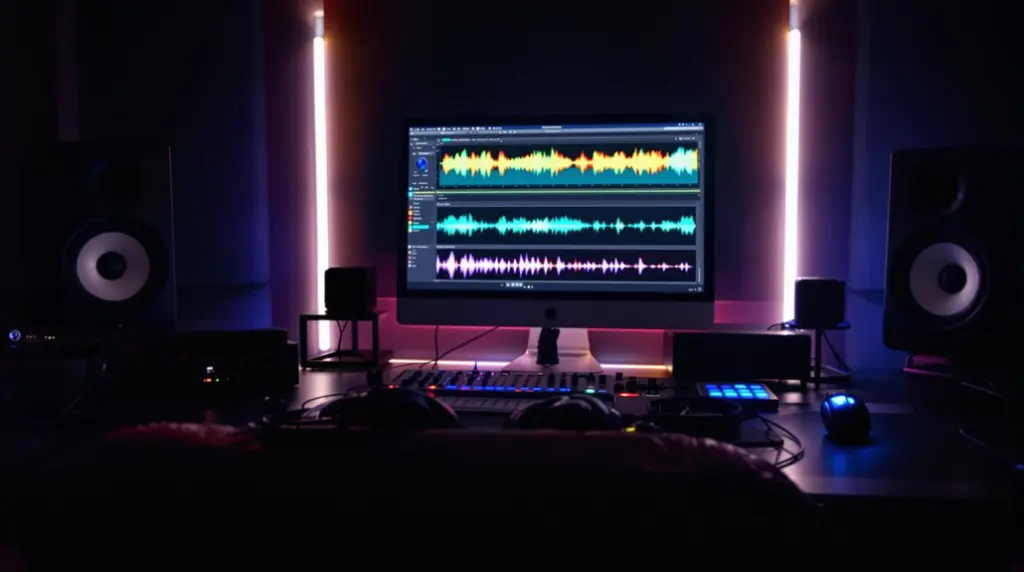To select the right professional mastering service, begin by evaluating the engineer’s experience—aim for someone with at least 5-10 years in the field. Confirm they have a diverse portfolio and consistent quality. Check the studio’s equipment setup, ensuring precise acoustics and high-quality gear. Investigate their genre expertise to match your style, and assess their communication skills for clear guidance. Review their track record, client feedback, and reliability. Understand the cost structure and analyze their sample work for a thorough process. These steps guarantee your music gets the professional edge it needs. Discover more insights and tips on this detailed process.
Key Takeaways
- Assess the engineer’s track record and diverse portfolio for consistent quality.
- Verify the studio’s acoustic setup and high-quality mastering gear.
- Ensure the mastering service has specialized knowledge in your genre.
- Establish clear communication channels for discussing technical and creative aspects.
- Evaluate client testimonials and reviews for reliability and service quality.
Assess Engineer’s Experience
To ensure you’re selecting the right mastering service, start by evaluating the engineer’s experience, focusing on those with at least 5-10 years in the industry. An engineer with this level of experience is likely to possess a nuanced understanding of the mastering process, having honed their skills over numerous projects.
When you evaluate industry experience, examine the engineer’s track record. A diverse portfolio showcasing successful projects across various genres is a strong indicator of versatility and adaptability.
Next, analyze project variety. An engineer who’s mastered tracks for different formats like streaming, vinyl, and CD demonstrates a broad skill set. This versatility can be essential for ensuring your music sounds its best across all platforms.
Also, scrutinize the quality consistency in their portfolio. Consistent client satisfaction and high-quality results are telltale signs of a competent professional.
Don’t forget to seek out testimonials or reviews from previous clients. These can provide valuable insights into the engineer’s expertise and professionalism. Positive feedback from a range of clients further substantiates the engineer’s capability to deliver excellent results.
Evaluate Equipment Setup
After evaluating the engineer’s experience, you should now focus on examining the mastering studio’s equipment setup to confirm it meets professional standards.
Start by evaluating the studio’s acoustics and monitoring setup. Precision in room acoustics is vital; it guarantees that sound adjustments are accurate and not colored by poor acoustic treatment. Properly treated rooms will allow you to hear the true nature of your tracks, leading to better mastering decisions.
Next, look for high-quality mastering gear. This includes reliable converters, equalizers, and compressors. Equipment reliability is crucial for consistent, high-quality output. High-end gear will provide the sonic enhancements needed to make your tracks shine.
Consider studios that utilize hybrid setups, combining both analog and digital equipment. This offers greater flexibility and varied processing options, catering to different mastering needs. It’s important to inquire about the mastering engineer’s experience with these specialized tools, ensuring they can manipulate sound with precision.
Lastly, make sure the studio can handle different audio formats and processing requirements. This versatility indicates a well-rounded setup capable of meeting diverse project demands.
Check Genre Expertise
When selecting a mastering service, you should verify they’ve specialized knowledge in your genre. This expertise enables more accurate and effective mastering decisions, customizing the sound to meet genre-specific expectations.
Ultimately, a service with relevant experience will enhance the authenticity and impact of your music.
Specialized Genre Knowledge
How can you guarantee your music reaches its full potential without a mastering engineer who understands your genre inside and out? Genre customization is essential for achieving the exact sound you envision.
A mastering engineer with specialized genre knowledge can make tailored adjustments that enhance the authenticity and impact of your music. This expertise ensures that the artistic interpretation of your work remains intact while optimizing for tonal balance and dynamic range.
Here are four critical reasons why you should check for genre-specific expertise:
- Authenticity: A genre-savvy engineer can enhance the unique elements that define your music, ensuring it sounds true to its style.
- Tonal Balance: Different genres require distinct tonal characteristics. An engineer familiar with your genre will know the necessary adjustments to achieve the ideal balance.
- Dynamic Range: Proper dynamic range adjustments are essential for maintaining the energy and emotion of your music. Genre expertise ensures these adjustments fit your style.
- Cohesive Sound: A mastering engineer experienced in your genre can deliver a professional, cohesive sound that aligns with industry standards, making your music more competitive.
Selecting a mastering engineer with specialized genre knowledge is a strategic decision that directly impacts the final quality of your music.
Relevant Experience Matters
Ensuring your music reaches its full potential requires selecting a mastering engineer with relevant experience in your specific genre. This expertise allows them to understand the nuances and requirements unique to your style, making informed decisions that enhance your music’s inherent characteristics. An engineer with a strong production background in your genre is essential. They can provide valuable insights and adjustments tailored to your music, ensuring it resonates with your target audience.
Additionally, mastering engineers with industry connections can offer a significant advantage. Their network can provide access to the latest trends and technologies, ensuring your music sounds current and competitive. These connections can also facilitate collaborations and opportunities that might otherwise be out of reach.
When evaluating potential mastering services, it’s imperative to review their portfolio and past projects within your genre. This will give you a clear indication of their capability to interpret your artistic vision accurately. A genre-specific mastering engineer can apply the necessary enhancements to produce a polished final product that maintains a cohesive and authentic sound.
Genre-Specific Techniques
Mastering engineers with genre-specific techniques often deliver a polished final product that enhances the authenticity and impact of your music. By understanding the genre nuances and applying tailored techniques, these experts guarantee your tracks resonate with the intended audience.
The specialization allows them to employ unique methods that align with each genre’s specific requirements, contributing to the overall cohesiveness and appeal of your music.
To effectively check for genre expertise, consider the following:
- Portfolio Review: Examine the engineer’s previous work within your genre. This will give you insights into their familiarity with genre nuances and their ability to apply tailored techniques.
- Client Testimonials: Look for feedback from artists within your genre. Positive reviews can confirm the engineer’s proficiency and how their specialized techniques have enhanced other projects.
- Sample Test: Request a sample mastering of one of your tracks. This test will help you evaluate their understanding of genre-specific requirements and their capability to deliver the desired sound.
- Technical Discussion: Engage in a detailed conversation about their approach to mastering your genre. This will reveal their depth of knowledge and the specific techniques they’d use.
Communication and Guidance
Effective communication and clear guidance from your mastering engineer are essential in guaranteeing your project’s success and aligning it with your creative vision. Establishing effective communication channels, such as email correspondence, ensures clarity and provides a documented trail of discussions. This helps prevent any misinterpretations and allows you to revisit prior conversations if needed.
Your mastering engineer should offer clear guidance throughout the process, advising on both technical aspects and creative input. This involves discussing various elements like dynamic range, tonal balance, and loudness to ensure the final product meets industry standards while resonating with your artistic intent. Don’t hesitate to share your creative vision and any specific preferences you have for the final sound.
Engage in discussions about any differences in creative vision early on. A trustworthy mastering service will welcome your input and provide constructive feedback, aiming for a collaborative approach. This synergy between you and the engineer is vital for achieving the desired outcomes.
Review Track Record
When reviewing a mastering engineer‘s track record, start by examining their past clientele and notable project highlights to assess their industry experience.
Look into the duration of their professional history and the consistency of their work across various genres.
Client testimonials and reviews will provide further insight into their reliability and quality of results.
Past Clientele Examples
Reviewing the past clientele examples is crucial in evaluating a mastering service’s track record and credibility. By examining who they’ve worked with, you can assess their proficiency and reliability. A portfolio featuring successful projects with well-known artists or labels serves as a strong credibility indicator. Additionally, clientele diversity can reveal the service’s flexibility and ability to handle various genres and styles.
Here are key points to ponder:
- Clientele Diversity: A wide range of clients across different musical genres suggests that the mastering service can adapt to your specific needs, whether you produce rock, pop, or classical music.
- Credibility Indicators: Working with renowned artists or top-tier labels can signify that the service is trusted and respected in the industry. This is often a direct reflection of their technical skill and reliability.
- Quality of Work: Past successful projects, especially those that have gained critical acclaim or commercial success, can provide a benchmark for the service’s potential impact on your music.
- Testimonials and Feedback: Positive reviews and testimonials from previous clients offer insights into the mastering service’s customer satisfaction and quality of work. Look for consistent praise in areas like sound quality, communication, and turnaround time.
Analyzing these elements helps you make an informed decision about which mastering service is right for you.
Industry Experience Duration
Evaluating the industry’s experience duration of a mastering service helps you determine their stability and expertise. The importance of experience duration can’t be underestimated when selecting a mastering service. Longevity in the industry often signals a company’s capacity to consistently deliver high-quality work, adapt to evolving trends, and integrate new technologies.
A mastering service with a long track record demonstrates reliability and proficiency. Such companies have likely encountered and overcome various challenges, honing their skills over time. This accumulated expertise translates into a refined understanding of the nuances involved in mastering diverse musical genres and styles. Experience duration importance lies in the service’s ability to maintain consistent quality and adapt to the dynamic nature of the music industry.
When reviewing the track record, focus on how many years the service has operated and the breadth of projects they’ve handled. Longevity and expertise are indicators of a well-rounded capability to meet your specific mastering needs. Services with extensive industry experience usually exhibit versatility, having worked on a wide range of projects.
This versatility is essential for ensuring your project receives the meticulous attention it deserves, ultimately resulting in a polished, professional sound.
Notable Project Highlights
To gauge the effectiveness of a mastering service, scrutinize their portfolio for notable project highlights across various genres. Analyzing their track record provides insight into their project diversity and successful collaborations, important indicators of their capability.
Here’s a methodical approach to evaluating a mastering service:
- Project Diversity: Examine the range of genres they’ve handled. A diverse portfolio demonstrates versatility and adaptability to different musical styles.
- Successful Collaborations: Look for high-profile or well-regarded collaborations within the industry. These partnerships often reflect the trust and respect the service commands from established artists and producers.
- Notable Achievements: Identify any awards or significant accomplishments. Industry recognition can be a strong indicator of quality and excellence in their work.
- Client Testimonials: Review feedback from past clients. Consistent positive reviews and high satisfaction levels suggest reliable and high-quality service.
Consider Client Feedback
When selecting a professional mastering service, client feedback offers crucial insights into the service’s reliability and quality. Conduct a thorough feedback analysis to evaluate the credibility of the mastering service. Positive client testimonials can greatly enhance the service’s reputation, indicating that previous clients were satisfied with the results. Look for consistent praise in areas such as communication, professionalism, and technical proficiency.
Evaluate the feedback from multiple sources to confirm it’s genuine and not limited to a few experiences. Consistent positive feedback across various platforms can suggest a high level of reliability and expertise. Conversely, pay attention to negative feedback as well. Issues such as missed deadlines, poor quality results, or a lack of responsiveness can reveal warning signs about the service’s performance.
A credibility assessment based on client testimonials helps you make a well-informed decision. Focus on the specifics mentioned in the reviews, noting any recurring themes. Whether clients highlight exceptional sound quality, timely delivery, or exceptional customer service, these details can guide your choice.
Test Their Reliability
Evaluating the reliability of a mastering service means examining their track record of meeting deadlines and delivering consistent quality. Begin by conducting a thorough trustworthiness assessment based on past clients’ feedback and reviews. This gives you insight into their ability to deliver on promises and maintain professionalism.
To systematically test their reliability, consider the following:
- Timeliness evaluation: Check if they’ve a history of meeting deadlines. Consistently late deliveries can disrupt your schedule and indicate poor time management.
- Communication consistency: Reliable mastering services prioritize clear and transparent communication. Look for evidence of prompt and professional responses to client inquiries.
- Professionalism verification: Assess their commitment to client satisfaction. A dependable engineer will address concerns and provide solutions without compromising the project’s integrity.
- Project completion track record: Investigate any instances of project delays or issues. A strong track record of problem-free project completions suggests a high level of dependability.
Understand Cost Structure
Grasping the cost structure of professional mastering services allows you to set accurate budget expectations and avoid unexpected expenses. Begin by seeking pricing transparency; most services charge per track or offer package deals for multiple songs. Analyze the cost breakdown to understand what you’re paying for, whether it’s the engineer’s experience, studio quality, or additional services like revisions and alternate versions.
Don’t overlook negotiation options. Some mastering engineers are open to discussing rates, especially for bulk orders or recurring projects. Identifying discount opportunities can greatly reduce your overall costs. For instance, many services provide discounts for multiple tracks or long-term collaborations. Always inquire about these options upfront.
Factor in any extra fees to avoid budget discrepancies. Expedited turnaround times or additional revisions can add to your total cost. Make sure these potential expenses are clearly outlined in your initial agreement.
Analyze Sample Work
How can you effectively evaluate a mastering engineer’s capabilities?
Analyzing sample work is important. It provides insight into the engineer’s style and output quality. Listen to before-and-after samples to gauge their ability to enhance tracks. This approach helps you understand their consistency and coherence across genres, making sure their style aligns with your artistic vision.
To perform a detailed style analysis and quality comparison, consider the following steps:
- Listen to Before-and-After Samples: Identify how the engineer has transformed raw tracks into polished versions. This showcases their enhancement skills.
- Evaluate Consistency: Check multiple samples across various genres. This reveals the engineer’s ability to maintain quality and coherence regardless of the musical style.
- Assess Versatility: Compare different sample tracks. A versatile engineer will demonstrate proficiency in multiple genres, reflecting their adaptability and skill level.
- Match Artistic Vision: Make sure the mastering engineer’s style complements your music. Their approach should resonate with your artistic goals and enhance your sound accordingly.
Frequently Asked Questions
How Do I Find the Right Mastering Engineer?
To find the right mastering engineer, review online portfolios and client testimonials. Evaluate their technical skills and experience by listening to mastered tracks. Effective communication and building a personal connection are essential for achieving your project’s vision.
What to Tell Your Mastering Engineer?
You’ll need to inform your mastering engineer about your preferred format and share specific references. Clearly communicate your goals, expectations, and any mix issues. Discuss stylistic preferences and intended distribution platforms for best results.
What Are Average Mastering Prices?
The average costs for mastering range from $50 to $150 per track. Price factors include the engineer’s reputation and experience. High-profile services can charge $300 to $500 per track, while online services offer fixed rates.
Is Landr a Good Mastering Service?
Landr is a good mastering service for automated mastering on online platforms. It’s convenient and cost-effective, but you might miss the personalized touch a human mastering engineer provides for more tailored, nuanced results.
Conclusion
When selecting the right professional mastering service, assess the engineer’s experience and evaluate their equipment setup.
Verify that they specialize in your genre and offer clear communication and guidance.
Examine their track record and take into account client feedback.
Test their reliability and understand their cost structure.
Lastly, analyze sample work to gauge their quality.
By following these steps, you’ll make an informed decision, guaranteeing that your music achieves the polished, professional sound you desire.




